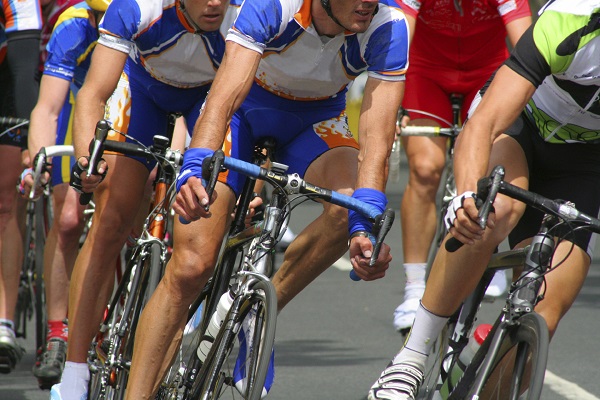All athletes can benefit from caffeine’s ergogenic effects.
Many people have experienced the welcomed effects of their favorite caffeine vehicle like coffee or an energy drink pushing them through a long day. However, even amongst athletes themselves, caffeine often gets a bad rap. In reality, using caffeine moderately and efficiently can enhance physical and mental performance.
When thinking of caffeine’s popular stimulatory effects, it’s easy to rationalize its attractiveness to endurance athletes to give them that extra boost to power through a long, strenuous workout. Researchers have proven caffeine’s efficacy time and again when it comes to supporting lengthened performance and focus for exhaustive endurance activities such as long distance running and swimming (1-3).
For example, one study involved giving advanced cyclists either a caffeine supplement or a placebo. During multiple time trials, researchers found that the caffeine consistently and significantly outperformed placebo for improving performance (1).
Caffeine’s effect has been most closely studied involving endurance, but has also been shown to aid athletes focusing on highly intense exercises of strength for a short duration (4). When given as a supplement to power athletes prior to a bench press exercise, those who ingested caffeine as opposed to a placebo were able to complete significantly more repetitions to failure.
Not only do athletes given caffeine outperform placebo, but they also experience a favorable mood state in response to the strenuous exercise (5).
Even for sprinters or athletes relying on rapid bouts of speed and agility, in team sports like soccer and rugby, caffeine has been shown to take performance to the next level (6; 7).
Despite these studies, many athletes shy away from the use of caffeine, especially when exercising in the heat, because they are under the impression that caffeine disturbs hydration. However, studies have shown that caffeine consumption does not inhibit hydration or cause an imbalance in electrolyte status (8).
Caffeine and Working Out
This doesn’t mean gulping down a pot of coffee every day. The dose for a better workout really appears to be in the low-to-moderate range: 3 to 6 milligrams per kilogram. There is no need to go overboard, as it does nothing further for performance (1; 9). But in moderation, a cup or two of quality coffee is enough to give that much needed pre-workout edge.
Or better yet, one or two Isagenix e+ shots. Capitalizing on the ergogenic benefits associated with caffeine, Isagenix incorporated a safe, and naturally sourced, 80 milligrams in the e+. Paired with a blend of Adaptogens—natural botanicals that have unique characteristics that help one’s body combat stress, focus one’s mind, and elevate one’s daily performance—athletes can use it as a pre-workout supplement to give their mental and physical performance a stable boost that won’t end in a jittery crash.
References
- Desbrow B, Biddulph C, Devlin B, Grant GD, Anoopkumar-Dukie S, Leveritt MD. The effects of different doses of caffeine on endurance cycling time trial performance. J Sports Sci. 2012;30(2):115-20. doi: 10.1080/02640414.2011.632431. Epub 2011 Dec 6.
- Graham TE. Caffeine and exercise: metabolism, endurance and performance. Sports Med. 2001;31(11):785-807.
- Hogervorst E, Bandelow S, Schmitt J, Jentjens R, Oliveira M, Allgrove J, Carter T, Gleeson M. Caffeine improves physical and cognitive performance during exhaustive exercise. Med Sci Sports Exerc. 2008 Oct;40(10):1841-51. doi: 10.1249/MSS.0b013e31817bb8b7.
- Davis JK, Green JM. Caffeine and anaerobic performance: ergogenic value and mechanisms of action. Sports Med. 2009;39(10):813-32. doi: 10.2165/11317770-000000000-00000.
- Duncan MJ, Oxford SW. The effect of caffeine ingestion on mood state and bench press performance to failure. J Strength Cond Res. 2011 Jan;25(1):178-85. doi: 10.1519/JSC.0b013e318201bddb.
- Glaister M, Howatson G, Abraham CS, Lockey RA, Goodwin JE, Foley P, McInnes G. Caffeine supplementation and multiple sprint running performance. Med Sci Sports Exerc. 2008 Oct;40(10):1835-40. doi: 10.1249/MSS.0b013e31817a8ad2.
- Schneiker KT, Bishop D, Dawson B, Hackett LP. Effects of caffeine on prolonged intermittent-sprint ability in team-sport athletes. Med Sci Sports Exerc. 2006 Mar;38(3):578-85.
- Roti MW, Casa DJ, Pumerantz AC, Watson G, Judelson DA, Dias JC, Ruffin K, Armstrong LE. Thermoregulatory responses to exercise in the heat: Chronic caffeine intake has no effect. Aviat Space Environ Med. 2006, 77:124-9.
- Pasman WJ, Van Baak MA, Jeukendrup AE, de Haan A. The effect of different dosages of caffeine on endurance performance time. Int J Sports Med. 1995 May;16(4):225-30.





